List of monarchs of Prussia
| Monarchy of Prussia | |
|---|---|
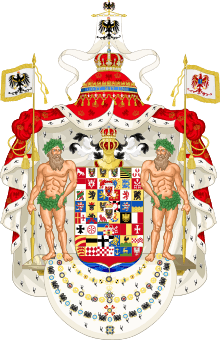 | |
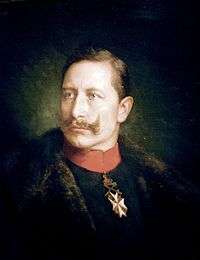 Wilhelm II | |
| Details | |
| First monarch | Albert (as Duke) |
| Formation | 10 April 1525 |
| Abolition | 9 November 1918 |
| Residence | Stadtschloss, Berlin (last) |
| Appointer | Hereditary |
The monarchs of Prussia were members of the House of Hohenzollern who were the hereditary rulers of the former German state of Prussia from its founding in 1525 as the Duchy of Prussia. The Duchy had evolved out of the Teutonic Order, a Roman Catholic crusader state and theocracy located along the eastern coast of the Baltic Sea. The Teutonic Knights were under the leadership of a Grand Master, the last of whom, Albert, converted to Protestantism and secularized the lands, which then became the Duchy of Prussia.
The Duchy was initially a vassal of the Kingdom of Poland, as a result of the terms of the Prussian Homage whereby Albert was granted the Duchy as part of the terms of peace following the Prussian War. When the main line of Prussian Hohenzollerns died out in 1618, the Duchy passed to a different branch of the family, who also reigned as Electors of Brandenburg in the Holy Roman Empire. While still nominally two different territories, Prussia under the suzerainty of Poland and Brandenburg under the suzerainty of the Holy Roman Empire, the two states are known together historiographically as Brandenburg-Prussia.
Following the Second Northern War, a series of treaties freed the Duchy of Prussia from vassalage to any other state, making it a fully sovereign Duchy in its own right. This complex situation (where the Hohenzollern ruler of the independent Duchy of Prussia was also a subject of the Holy Roman Emperor as Elector of Brandenburg) laid the eventual groundwork for the establishment of the Kingdom of Prussia in 1701. For diplomatic reasons, the rulers of Prussia called themselves King in Prussia from 1701 to 1772. They still nominally owed fealty to the Emperor as Electors of Brandenburg, so the "King in Prussia" title (as opposed to "King of Prussia") avoided offending the Emperor. Additionally, calling themselves "King of Prussia implied sovereignty over the entire Prussian region, parts of which were still part of Poland.
As the Prussian state grew through several wars and diplomatic moves throughout the 18th century, it became apparent that Prussia had become a Great Power in its own right. By 1772, the pretense was dropped, and the style "King of Prussia" was adopted. The Prussian kings continued to use the title "Elector of Brandenburg" until the end of the Holy Roman Empire in 1806, reflecting the legal fiction that their domains within the empire were still under the ultimate overlordship of the Emperor. Legally, the Hohenzollerns ruled Brandenburg in personal union with their Prussian kingdom, but in practice they treated their domains as a single unit. The Hohenzollerns gained de jure sovereignty over Brandenburg when the empire dissolved in 1806, and Brandenburg was formally merged into Prussia.
In 1871, in the aftermath of the Franco-Prussian War, the German Empire was formed, and the King of Prussia, Wilhelm I was crowned German Emperor. From that point forward, though the Kingdom of Prussia retained its status as a constituent state of the empire (albeit by far the largest and most powerful), all subsequent Kings of Prussia also served as German Emperor, and that title took precedence.
Duchy of Prussia (1525–1701)
| Name | Lifespan | Reign start | Reign end | Notes | Family | Image |
|---|---|---|---|---|---|---|
| Albert | 17 May 1490 – 20 March 1568 (aged 77) | 10 April 1525 | 20 March 1568 | Hohenzollern | .jpg) | |
| Albert Frederick | 7 May 1553 – 28 August 1618 (aged 65) | 20 March 1568 | 28 August 1618 | Son of Albert | Hohenzollern | |
| John Sigismund | 8 November 1572 – 23 December 1619 (aged 47) | 28 August 1618 | 23 December 1619 | Cousin of Albert Frederick, also Elector of Brandenburg | Hohenzollern | |
| George William | 13 November 1595 – 1 December 1640 (aged 45) | 23 December 1619 | 1 December 1640 | Son of John Sigismund, also Elector of Brandenburg | Hohenzollern | |
Frederick William
| 16 February 1620 – 29 April 1688 (aged 68) | 1 December 1640 | 29 April 1688 | Son of George William, also Elector of Brandenburg | Hohenzollern | 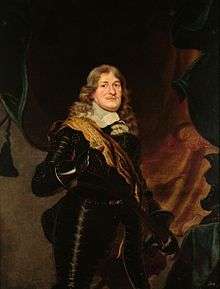 |
| Frederick I | 11 July 1657 – 25 February 1713 (aged 55) | 29 April 1688 | 18 January 1701 | Son of Frederick Wilhelm, also Elector of Brandenburg | Hohenzollern | .jpg) |
Kingdom of Prussia (1701–1918)
| Name | Lifespan | Reign start | Reign end | Notes | Family | Image |
|---|---|---|---|---|---|---|
Frederick I
| 11 July 1657 – 25 February 1713 (aged 55) | 18 January 1701 | 25 February 1713 | Son of Frederick William | Hohenzollern | .jpg) |
Frederick William I
| 14 August 1688 – 31 May 1740 (aged 51) | 25 February 1713 | 31 May 1740 | Son of Frederick I | Hohenzollern | 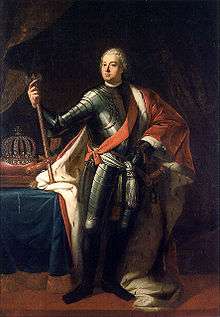 |
Frederick II
| 24 January 1712 – 17 August 1786 (aged 74) | 31 May 1740 | 17 August 1786 | Son of Frederick William I | Hohenzollern | .jpg) |
| Frederick William II | 25 September 1744 – 16 November 1797 (aged 53) | 17 August 1786 | 16 November 1797 | Nephew of Frederick II | Hohenzollern | .jpg) |
| Frederick William III | 3 July 1770 – 7 June 1840 (aged 69) | 16 November 1797 | 7 June 1840 | Son of Frederick William II | Hohenzollern | .jpg) |
| Frederick Wilhelm IV | 15 October 1795 – 2 January 1861 (aged 65) | 7 June 1840 | 2 January 1861 | Son of Frederick William III; also President of the Erfurt Union (1849-1850) | Hohenzollern | 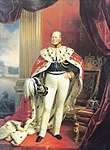 |
| William I | 22 March 1797 – 9 March 1888 (aged 90) | 2 January 1861 | 9 March 1888 | Brother of Frederick Wilhelm IV; also President of the North German Confederation (1867-1871) and German Emperor from 1871 | Hohenzollern | 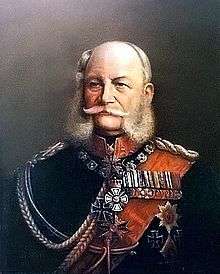 |
| Frederick III | 18 October 1831 – 15 June 1888 (aged 56) | 9 March 1888 | 15 June 1888 | Son of William I; also German Emperor | Hohenzollern | 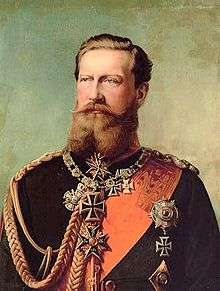 |
| William II | 27 January 1859 – 4 June 1941 (aged 82) | 15 June 1888 | 28 November 1918 (abdicated) [2] | Son of Frederick III; also German Emperor | Hohenzollern |  |
Timeline

Pretenders to the Throne of Prussia (1918–present)
- William II (28 November 1918 – 4 June 1941)
- Frederick William (4 June 1941 – 20 July 1951)
- Louis Ferdinand (20 July 1951 – 26 September 1994)
- George Frederick (26 September 1994 –present)
See also
- Constitution of Prussia (1850)
- Crown of Frederick I
- Crown of William II
- German Emperor
- History of Germany
- History of Prussia
- Hohenzollern Castle
- King in Prussia
- List of German monarchs
- List of rulers of Brandenburg
- List of Prussian consorts
- Lückentheorie
- Minister President of Prussia
- Neuchâtel Crisis
- Year of the Three Emperors
References
- ↑ Spencer, Charles, Blenheim, Chapter 22: Vindication, p.316
- ↑ Statement of Abdication of William II
Bibliography
- Hull, Isabel V. (2004), The Entourage of Kaiser Wilhelm II, 1888–1918 .
- Horne, Charles F. (2009), Source Records of the Great War, Kessinger Publishing, ISBN 1104855534